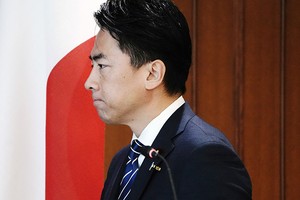Vox Populi, Vox Dei is a daily column that runs on Page 1 of The Asahi Shimbun.
June 14, 2021 at 12:55 JST
 Leaders of the Group of Seven industrialized nations gather in Cornwall, Britain. (Provided by the British government)
Leaders of the Group of Seven industrialized nations gather in Cornwall, Britain. (Provided by the British government)
Trees in a forest may be more altruistic than we might think.
In “The Hidden Life of Trees,” German forester and author Peter Wohlleben writes about the stump of a beech tree likely cut down 400 to 500 years earlier.
It is still alive and has not decayed, apparently because nearby trees provide sugar through their roots. Trees in a forest nourish sick ones, hopefully, until they recover.
“The reasons are the same as for human communities: There are advantages to working together,” Wohlleben writes.
If many trees die and the forest thins, strong winds tend to sweep through. If the summer sun directly reaches the forest floor, the soil dries out.
I often think about altruism because of the novel coronavirus pandemic.
We behave cautiously to help prevent others from becoming infected. We have heard stories about donations and other support provided for people who have fallen on hard times.
However, on a global scale, rich nations appear to be acting in a self-centered manner.
Last month, Tedros Adhanom Ghebreyesus, director-general of the World Health Organization, said more than 75 percent of all vaccines have been administered in just 10 countries.
“The ongoing vaccine crisis is a scandalous inequity that is perpetuating the pandemic,” he said.
An explosion of infections in any given place on Earth tends to spawn virus variants and delay the recovery of the world economy. It affects every country.
The agreement at the summit of the Group of Seven industrialized nations to donate 1 billion novel coronavirus vaccine doses to developing countries is a welcome, albeit belated, step forward.
No one can secure their own interest without helping others. The world in the grip of an infectious disease seems to be one large forest.
--The Asahi Shimbun, June 13
* * *
Vox Populi, Vox Dei is a popular daily column that takes up a wide range of topics, including culture, arts and social trends and developments. Written by veteran Asahi Shimbun writers, the column provides useful perspectives on and insights into contemporary Japan and its culture.




















A peek through the music industry’s curtain at the producers who harnessed social media to help their idols go global.
A series based on diplomatic documents declassified by Japan’s Foreign Ministry
Here is a collection of first-hand accounts by “hibakusha” atomic bomb survivors.
Cooking experts, chefs and others involved in the field of food introduce their special recipes intertwined with their paths in life.
A series about Japanese-Americans and their memories of World War II